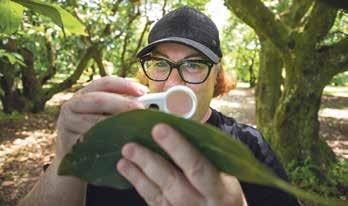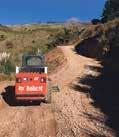

 Explore what Redwood Valley Farm is all about on pages 6-7. Photo: John Borren.
Explore what Redwood Valley Farm is all about on pages 6-7. Photo: John Borren.
It’s been a steep learning curve for John and Alicia Ludemann who’ve turned a mostly neglected property into a thriving orchard.
As newbie orchardists, they’ve embraced challenges and learned
from mistakes, to achieve sustainable success.
It was March 2017 when they decided on a shift from Queensland, Australia. “We’d just had our son and John wanted to bring Lachie up in New Zealand,” says Alicia.



“I was working in hospital administration and John was in the mines. I was looking for a dual income property with kiwifruit and avocados and enough land for stock so we could feed ourselves,” says John.












“ is property at 10.11ha had both crops and some bare land so we could build the house and shed that we wanted.”
eir property is divided into around 2ha of Hayward green kiwifruit, 365 avocado trees on around 2.64 canopy hectares with space for cattle and sheep.
“At rst, only the kiwifruit was under management, but we always wanted to be hands on, so we took over the avocados ourselves straight away,” says John.
Learning
“ e previous owners had neglected the avocados for about 10 years. ey hadn’t been fertilising or pruning,” says Alicia. “We threw ourselves into learning and signed with Trevelyan’s. e technical support we’ve got from them has been so helpful. We wanted to be environmentally sustainable.”
Regenerative farming aims to make farms stronger, starting with the soil. “We try to limit our footprints and compaction on the orchard,” says Alicia. “We don’t use heavy machinery other than for spraying or harvesting with pickers. We limit the times we mow which cuts down on fuel and helps retain biodiversity. We incorporate compost in our fertiliser programme and that helps with the mycelium which is the main fungi that avocados require to uptake all their nutrients. We do a structural prune every year and then John just prunes as needed.
“We’re adding seaweed with Stimplex into our sprays to help the trees recover and to encourage bene cial bugs. One of the reasons I completed my AvoGreen certi cation was to become more accurate with spray application times. One ladybug can eat up to a hundred six-spotted mites in a day.”
Biodiversity gives the ladybugs and other insects something to forage o .
“For the rst few years, we did put a lot of fertiliser on to build the soil health,” says
Alicia. “Now, we can fertilise and compost a handful of times through the year. We’re trying to be innovative, so we use a PFP lime that has humates in it. John can spread it himself and it absorbs into the soil better and has been better for our pH.”
It took four years to improve the health of the avocados. From a yield of just 30 bins in their rst year, John and Alicia are now averaging 110 bins per year. A balance
“ e avocados were really sick,” says Alicia. “In fact, when we bought the property we were told to rip them out, but we wanted to learn from them.
Avocado trees are very forgiving. You can make the odd mistake with them but you can’t with kiwifruit. For that, you’ve got to be precise.”
For John and Alicia, it’s a balance of regenerative practices and commercial needs.
“We don’t spray if we don’t have to,” says Alicia. “We don’t fertilise as much because we incorporate organic practices like composting and reducing our impact by not mowing or using



heavy machinery. We don’t even own a tractor which is harder on John but it’s not compacting the ground and we’re not using as much fuel.”
John and Alicia don’t just think season by season. ey create plans for three years into the future.
eir aim is to have a consistent bin number of 150 every year by carrying out a radical structural prune in winter followed by light pruning as needed. “We’ve done well with the avocados. ey’re now very healthy trees,” says Alicia.
Experimenting
ey’ve altered their management plan for the kiwifruit this year to work towards higher yields. “We harvest some of our male owers prior to the female owers opening
to extract pollen which gets used in the gold orchards but also in the green. We did hit nearly 15,000 trays per hectare, which is really good for a green orchard and we want to get around that number on an annual basis.”
ey’ve also been experimenting with arti cial pollination to improve the size and shapes of fruit on lower yielding blocks. “I love learning,” says Alicia. “I’ll get excited about something and then John has to listen to me going on about it. We’re hands-on in the orchard with our orchard manager’s support and he’s taught us so much as well. We’ve gone from getting about 13-18 per cent rejects to now around 3-5 per cent and that’s because we’ve worked so hard.”

















e pint-sized produce of a Te Puke mum and daughter team has proved so popular that their customers successfully




Mama Kali’s brand is now in 16 grocery and organics stores around Bay of Plenty, Waikato and Hawke’s Bay as well as being sold online. It’s just over a year since Kali Yu and her daughter, Jiang Yu, decided to go into business together when they lost their horticulture jobs during lockdown.
“It was amazing to get those phone calls from store managers telling us our produce was being requested,” says Jiang Yu.
“I think it’s because we specialise in microgreens and a lot of people love our special salad mix and our baby broccoli in particular. It’s more nutrient dense than regular broccoli and has a nice mild avour and a lot of mums like that for kids’ sandwiches.”
Baby vegetable
Microgreens are fast growing –taking around 14 days before they can be harvested.
“Microgreens are quite special,” says Jiang Yu. “ ey’re basically a baby vegetable. It’s the fastest crop you can grow.
“ ey’re proven to be 40 times more nutritious than the mature vegetables. It’s become really popular through word of mouth with people who juice them or just sprinkle micro greens onto their meals.
“Because it’s so concentrated, you don’t need a lot. You could just add a handful onto eggs or into your sandwich or in smoothies. It’s so convenient and easy to add nutrient value.”
Mama Kali and JiangYu are committed to being environmentallysustainable. Eco-friendly packaging,
mindful water use and organic growing techniques that avoid chemical sprays and they take time to harvest by hand.
“We care a lot about what we use in the soil. Most other microgreen farmers use a machine because it’s more e cient. It takes them around 15 seconds per tray. We take about four or ve minutes to cut each tray by hand. It’s more time-consuming but the result is worth it.”
Jiang Yu says the labour-intensive traditional method means there’s less chance of bruising or damage to their crops, which makes them last longer in the fridge.
Nutrients
“Mum and I believe in quality over quantity. We swear by that; it’s our point of di erence.”
Mama Kali and Jiang Yu sell at farmers’ markets as well as in supermarkets but are keen to share their knowledge and inspire the community to be healthier.
“It’s surprising how many people still don’t know what microgreens are but it’s de nitely a growing industry,” says JiangYu. “We sell seed kits and we’ve done workshops to teach people how to grow their own or for their neighbours. Elderly people love it because a full garden can be a big chore but these can live on the kitchen bench. We love that people are now thinking about what microgreens are.
“Some people think they’re just a garnish at a fancy restaurant but microgreens are so much more than that. ey’re a really great dose of nutrients.”
Debbie Griffiths






It was a sudden health scare that brought long-time farmer Dave Hannah to an abrupt and unexpected halt.
e slow recovery, though, allowed him to turn his attention to something he loved.
“I’ve always liked xing and making stu . As a farmer, I say: ‘Fix it, don’t throw it’. As we got busier with farming, though, it kind of went out the back door.”
Wake-up call
Dave and his wife Leigh were Waikato dairy farmers for almost 30 years before buying a kiwifruit and avocado orchard ve years ago. Just three months after taking over their new property just north of Katikati, Dave got the worst kind of wake-up call. “ e orchard had a manager, so I’d been helping with mowing and general maintenance and had actually started looking for another job when the health issues happened. I was stu ed for a year. en I slowly started mucking around with pieces of wood in the shed.
“I made some furniture for Leigh and she liked it so much she suggested I keep making it and we could sell it.”
e hobby quickly became a booming success with Kauri Point Woodcraft selling online as well as in stores in Tauranga, Katikati and Waihī. Dave creates, Leigh packages and their daughter Annalise helps with marketing.
“I have old door and window frames and use milled timber from our huge avocado trees, and I break down and repurpose old wine barrels.”
Dave sources them from a small winery in Hawke’s Bay, using the French oak timber to
create beautiful pieces. Among the best-sellers are barrel head platters with a lazy susan, homewares and an array of platters made from barrel staves.
Oak
“Oak is just a beautiful wood to work with and I use every part of each barrel. It’s pretty cool that people have my work in their homes. I believe I’ve made around 800 pieces, so far. My kids got about the rst hundred,” laughs Dave. “‘Not another board, dad! [they said]’. I’ve really surprised myself with what I’ve achieved.
“It’s genuinely not something I ever thought I would do but it worked so well because I could do a bit, then rest, then carry on when I felt well enough. Now, it’s virtually full-time.”
Dave’s unique, hand-crafted homewares range from stirring spoons, candle holders to tables and bench seats.
“I think customers like that they’re made from recycled wood. ere’s something really special about each one being di erent. It’s something no one else has and I make them well, so they will last forever.”
















The

wait is almost over





Warm sunlight streams through ittering leaves, creating freckles of gold upon your face below as the cool stream ows gently around you.



Happily lost in the depths and tranquillity of nature, your mind unwinds at last.
Redwood Valley Farm in Paengaroa has always been a place the Robinson’s family visited for a peaceful getaway, until 10 years ago when they were able to take the farm over for themselves.
“We were staying here, being like: ‘Wouldn’t it be wonderful to come and manage the place?’ and so when the opportunity came to buy it – it was really unbelievable for us,” says Marty Robinson, who runs the farm with his wife Chrissi.
Decades of planting
e farm’s original owners were Geo and Jill Brann, who moved on to the property around 1964 through a government ballot. “[Geo and Jill] started planting trees back in the 1960s so the farm is actually what farms looked like after 50 years of planting streamside – so it’s kind of a good lighthouse as far as what it can look like when farm and country do erosion control,” says Marty. e farm has about 75 hectares worth of land. “About one-third of it is native bush and one-third is forestry on park land, then one-third of it is unpacked, mainly for drystock cows – so there’s a real mixture.”
Woven through all this, is the farm’s spring-fed stream. “It’s just crystal clear most of the time so we’ve been going swimming every day [over summer]. It’s pretty refreshing but it’s just amazing

lying in the water and looking up at the native trees above you. e water’s just nice and clear as it ows past you and you just go: ‘Wow’. It’s a pretty amazing place.”
Stormy night
Last year in May the farm was hit by a heavy storm in the night, creating damage to the stream and tracks. With lots of clean-up e orts and help from the community, Marty says they are “doing alright”. “ ere’s lots more that we’d like to do to improve the tracks, and bits and pieces like that – but that just all takes time and money, which we don’t have a lot of.
“ e good thing is none of the paddocks or the accommodation was a ected, so we’ve been able to carry on with most of the things that we were doing. Families are just adapting to it being slightly di erent than what it was, but a lot of the people that turn up don’t know that much of the stream was damaged.”
Reconnecting
Redwood Valley Farm has a mix of ‘back to basics’ cabins and campsites to enjoy the farm for days

on end, or people can visit during daylight hours for free. “We just want people to spend time in a place that’s pretty unique and natural, very limited cellphone reception, no internet, so it’s a great way for families to connect with each other,” says Marty.
“A lot of the activities are what we used to do as kids hanging around on friend’s farms – but a lot of people don’t get the opportunity these days. ere’s swings about and lots of little hideaway places that kids can build bivvies and just get in the bush and do lots of little things to explore.”
Plus there’s resident highland cows, chickens, ‘Bella’ the goat and plenty of native birds to spot.
“For us, it’s the people – and what we do and what happens with the people that matters. e families are reconnecting, they’re getting to know each other better –that really inspires us to do what we do.”
For more information on Redwood Valley Farm, visit: https:// redwoodvalleyfarm.co.nz/





























